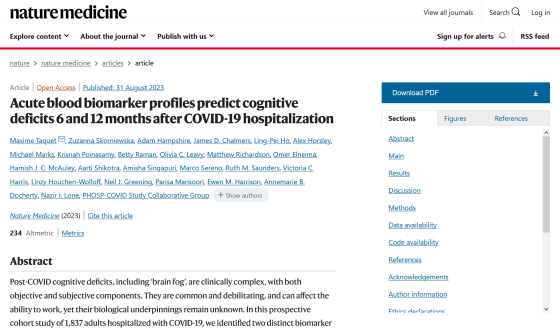It has been shown that 'brain fog', a decline in cognitive function associated with long COVID, which is an aftereffect of the new coronavirus, may be related to blood clots.

Some '
Acute blood biomarker profiles predict cognitive deficits 6 and 12 months after COVID-19 hospitalization | Nature Medicine
https://doi.org/10.1038/s41591-023-02525-y

Long COVID brain fog may be caused by blood clots, say scientists – POLITICO
https://www.politico.eu/article/long-covid-brain-fog-caused-blood-clots-study-scientists/
Brain fog in long COVID may be linked to blood clots | Live Science
https://www.livescience.com/health/coronavirus/brain-fog-in-long-covid-may-be-linked-to-blood-clots
Long COVID is a general term for various after-effects that last from several weeks to several years after the onset of COVID-19, and is known to include severe fatigue, worsening of respiratory function, and decline in cognitive function. Previous studies have reported that some Long COVID patients still have cognitive problems nearly two years after onset of symptoms.
It turns out that the decline in cognitive function due to ``long COVID'' can persist for more than two years after infection with the new coronavirus - GIGAZINE

To gain insight into Long COVID, which is estimated to have affected as many as 36 million people in Europe over three years , a British research team studied 1,837 adults hospitalized with COVID-19. We investigated the relationship between biomarkers associated with long-term COVID-19 and cognitive function decline due to long COVID-19.
Participants were surveyed on six biomarkers upon admission and completed objective measures and subjective reports of cognitive function 6 and 12 months after hospitalization for COVID-19. The average age of the subjects was 57.9 years old, with 36.6% female and 57.7% male.
As a result of the analysis, a protein called fibrinogen , which is necessary for the formation of blood clots and scabs, is associated with a decline in objective cognitive function, and fragments of a protein called D-dimer , which are produced when blood clots are broken down, are associated with a decline in subjective cognitive function. It turned out to be a predictive factor.
Compared to patients with less fibrinogen in their blood, those with more fibrinogen scored lower on tests of memory and attention. In addition, people with high levels of D-dimer tended to have lower cognitive function ratings than those with low levels of D-dimer in subjective surveys, and were more likely to report that they were having trouble working.

Chris Breitling, co-author of the paper and professor of respiratory medicine at the University of Leicester, said: 'I am optimistic that science is beginning to provide insight into the causes and potential treatments for long COVID. I feel it,” he said. However, he admits that there are still many patients who have not recovered, and it is worrisome that it is unclear how long it will take for them to recover.
Lead author of the paper, Dr Maxime Take, a clinical psychiatrist at the University of Oxford, said the fibrinogen-related blood clots may alter blood flow to the brain, or there may be a direct interaction between the blood clots and nerve cells. He thinks that there is a sex.
Dr Aravinthan Varatharaj, a neurologist at the University of Southampton who was not involved in the study, said: 'Future research will suggest that treatments that target blood clotting, such as blood thinners, may help people with these conditions. We need to find out if that's the case.'

Related Posts:
in Science, Posted by log1h_ik







